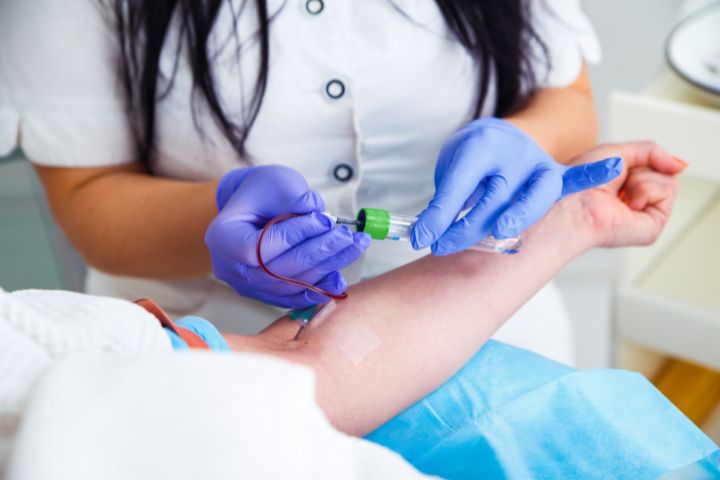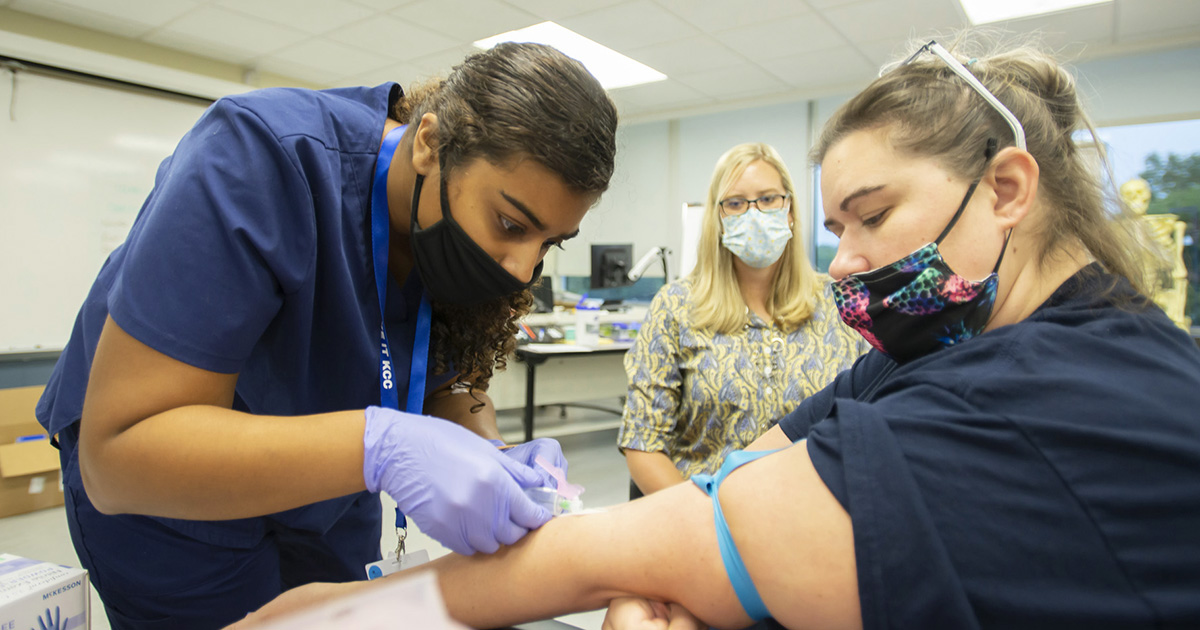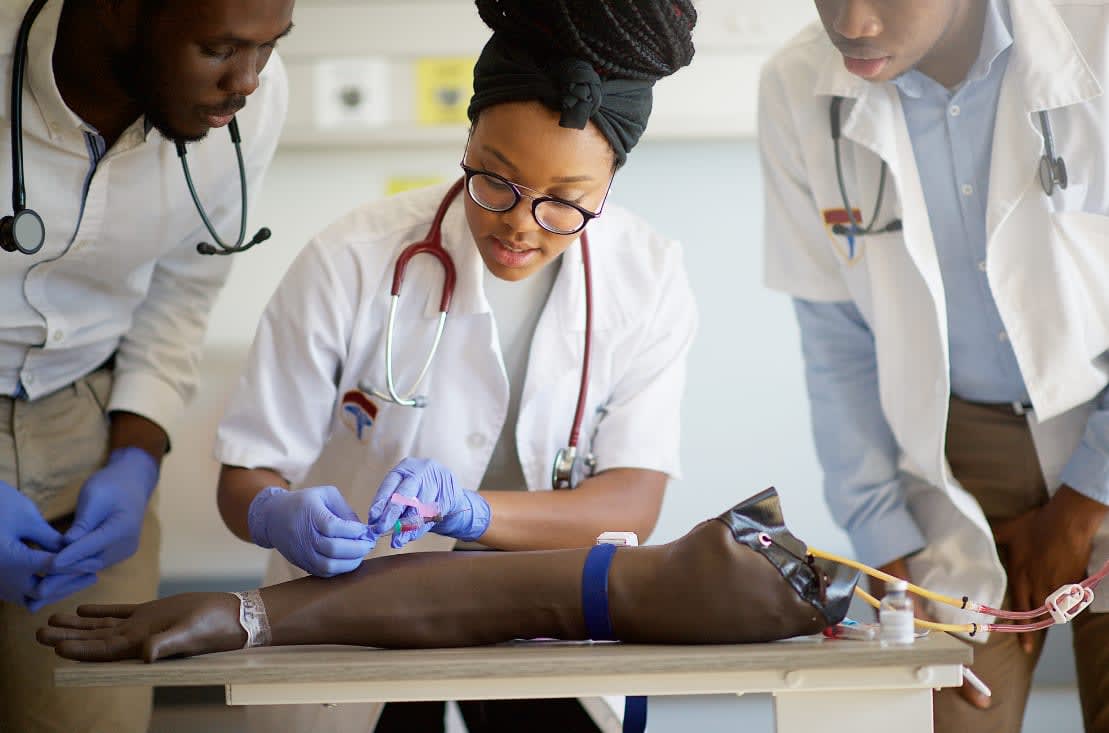Phlebotomy school FAQs: Everything Beginners Ask
Wiki Article
The Path to Certification: Comprehending the Phlebotomy Training Program Journey and Its Value
As you take into consideration the course to qualification in phlebotomy, it is necessary to recognize the duty you'll play in medical care. Your training will certainly cover essential skills, from blood collection strategies to patient communication. Each part of the program prepares you for the obstacles in advance. What exactly does the journey require, and why is qualification so vital for your future occupation? Allow's check out these questions further.
The Function of Phlebotomists in Healthcare
Phlebotomists play a crucial function in the medical care system, functioning as the important web link between people and necessary diagnostic screening. You'll carry out blood attracts, guaranteeing examples are collected properly and safely. Your expertise assists in diagnosing clinical problems, keeping an eye on health, and leading treatment decisions.In your day-to-day interactions, you'll require to establish depend on with patients, making them really feel comfy during what could be a stressful experience. You are in charge of labeling and taking care of samples meticulously to stop contamination or errors, which might influence test outcomes.
Past this, you'll commonly function along with medical professionals and registered nurses, connecting critical information about patients' problems. By understanding your abilities, you add meaningfully to person treatment, making you a vital component of the medical team.
Overview of Phlebotomy Training Programs
When exploring phlebotomy training programs, you'll find various kinds made to fit various routines and discovering styles. Each program helps you create crucial abilities like blood collection and individual interaction. Understanding these options is key to picking the appropriate course for your job.Sorts Of Training Programs
A number of kinds of training programs are available for those looking to come to be proficient in phlebotomy. Furthermore, some hospitals and centers use on-the-job training programs, providing useful experience while you find out. Whatever path you select, each program intends to outfit you with the necessary skills for an effective phlebotomy career.
Key Skills Developed
Understanding phlebotomy requires a collection of vital skills that are established via detailed training programs. Additionally, communication abilities are fundamental; you'll need to engage with people, clarify procedures, and put them at simplicity. Each of these skills is necessary for your success as a certified phlebotomist, making you a beneficial asset in any health care setup.Secret Elements of a Phlebotomy Course
In a phlebotomy program, you'll concentrate on necessary topics that lay the groundwork for your future occupation. You'll participate in hands-on training that permits you to use what you have actually found out in real-world settings. Both the core curriculum and practical experience are essential for your success as a phlebotomist.Curriculum Review
While pursuing a phlebotomy training program, you'll come across a curriculum designed to equip you with basic skills and understanding. Phlebotomy Courses Near Me. This educational program normally includes anatomy and physiology, concentrating on the blood circulation system and comprehending blood components. You'll additionally discover various kinds of blood collection techniques, consisting of venipuncture and capillary slit strategiesIn addition, infection control and security protocols are crucial elements, guaranteeing you understand exactly how to maintain a sterilized setting. You'll study patient communication, emphasizing communication and empathy, which are essential for easing client anxiety.
Hands-On Training Experience
Obtaining hands-on experience is a vital component of your phlebotomy training course. This functional training enables you to apply what you've learned in a real-world setting, enhancing your abilities and confidence. You'll practice venipuncture strategies, discover just how to take care of different sorts of specimens, and obtain knowledgeable about the devices made use of in the field. Under the guidance of experienced instructors, you'll refine your abilities, guaranteeing you're prepared for any kind of circumstance you could encounter.Furthermore, you'll obtain the opportunity to connect with clients, which is essential for developing your communication abilities. This mix of technological proficiency and social abilities is essential for your success as a qualified phlebotomist. Eventually, hands-on training is where concept meets technique, strengthening your understanding and preparedness for accreditation.
Certification and Licensing Needs
Before you can begin your profession in phlebotomy, it is crucial to understand the certification and licensing demands that differ by state. The majority of states need phlebotomists to hold a qualification from an identified organization, such as the National Phlebotomy Association or the American Society for Clinical Pathology. These certifications typically entail passing an exam that evaluates your understanding and skills in the field.In addition to accreditation, some states have details licensing demands. You might need to finish a specific variety of hours in scientific method, send proof of training, or go through a history check. It is essential to research your state's guidelines to make certain you meet all essential criteria.
Staying browse around here educated about these requirements not just aids you safeguard a position but additionally enhances your integrity as a professional. By satisfying these demands, you'll be well on your means to a successful occupation in phlebotomy.
Hands-On Training and Practical Experience
Hands-on training and useful experience are crucial parts of your phlebotomy education and learning, as they enable you to use theoretical knowledge in real-world circumstances. During your training, you'll engage in supervised venipuncture, find out proper strategies, and end up being acquainted with different blood collection devices. This direct participation is important for developing your self-confidence and sharpening your abilities.You'll function closely with knowledgeable professionals who can assist you with the subtleties of individual communication and sample handling. Each practice session not only enhances your understanding yet also prepares you for the busy environment of healthcare setups.
In addition, several programs integrate professional turnings, allowing you to experience varied setups, from medical facilities to outpatient clinics. This exposure aids you adapt to different difficulties and patient needs, guaranteeing you're well-prepared for your future duty. Accept these possibilities, as they're vital to coming to be a competent and compassionate phlebotomist.
Obstacles Encountered During Training
While obtaining hands-on experience is vital, it is very important to recognize the obstacles that can occur throughout your phlebotomy training. You could experience anxiousness when carrying out procedures on real patients, specifically if you're new to the atmosphere. The stress to get whatever right can be overwhelming. Additionally, mastering the abilities required for blood draws takes technique; you may fight with strategy at first.Time management can additionally be a hurdle, as balancing theory, useful sessions, and individual commitments can really feel challenging. You may encounter differing learning speeds among your peers, resulting in sensations of self-doubt if you believe you're dropping behind. Finally, adapting to the different characters of instructors can be challenging, as each may have a special mentor style.
Recognizing these challenges beforehand can prepare you for success and aid you develop strength throughout your training trip.
Profession Opportunities After Accreditation

As you obtain experience, you could also take into consideration concentrating on areas like pediatric or senior citizen phlebotomy, accommodating specific client demands. Some phlebotomists select to advance their occupations by ending up being lab specialists or seeking additional education in medical care areas.
Furthermore, your qualification can result in roles in training or overseeing brand-new phlebotomists, permitting you to share your knowledge. With the medical care industry continually expanding, your abilities will always be in demand, leading the way for a stable and satisfying occupation. Welcome the chances waiting on you!
Often Asked Concerns
What Is the Normal Period of a Phlebotomy Training Course?
Phlebotomy training courses typically last around 4 to eight weeks. You'll take part in hands-on practice, class direction, and on-line learning. Finishing this training prepares you for certification and a fulfilling career in medical care.Are Online Phlebotomy Courses Available?
Yes, online phlebotomy programs are offered. They offer adaptability and ease, permitting you to research at your very own rate. Simply validate the program is approved to satisfy qualification requirements and obtain important abilities for your occupation.Just How Much Does Phlebotomy Training Generally Expense?
Phlebotomy training typically costs between $700 and $2,500, relying on the program and location. You must consider variables like training course length, included materials, and hands-on experience when choosing the appropriate training for you.What Are Typical Requirements for Phlebotomy Training?
Common prerequisites for phlebotomy training usually include a secondary school diploma or GED, booster shots, and a history check. Some programs might likewise require basic health care understanding or accreditations, guaranteeing you're prepared for hands-on training.Can I Work While Completing My Phlebotomy Training?
Yes, you can work while finishing your phlebotomy training. Lots of pupils equilibrium tasks with their studies, however make certain to manage your time efficiently to assure you satisfy both job and training commitments effectively.Report this wiki page